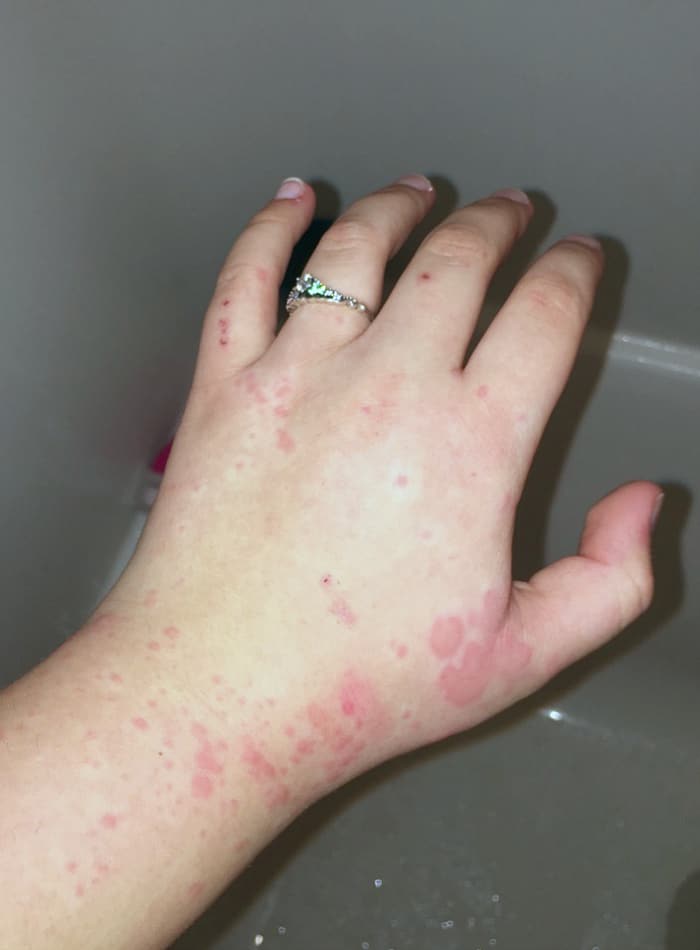The Challenges of Managing Eczema
Parenting is a loaded term, am I right? Each stage brings a whole different set of strategies, and just when you think you have it down – and, switch!
Not just learning and growing, added to this is the more difficult times of when our kids are sick or have a condition. We do the best we can, but always have that doubt. Then, when the challenge is over, we think we have the knowledge and skills to master it the next time, yet we always seem to be back to square one when that time does come.
More so when it’s a condition that is so varied in nature, a simple cause and treatment sometimes isn’t in the cards.
Case in point? Atopic dermatitis, or the more well-known name, Eczema.
When two of my children were toddlers, they developed eczema, and it was very tough to manage.
Not only was finding relief frustrating, but it was made worse by the fact that they were so little. It was difficult to keep them from rubbing and scratching the affected areas. A comfortable daily life for them, was just more challenging due to its symptoms.
I so vividly recall their eczema affecting their sleep so much. In fact, according to the Eczema Society of Canada’s Patient Insights Report, 58% of parents/caregivers report interrupted or loss of sleep for a child with eczema1. Like a lot of cases, our drastic change in seasons exacerbated the condition2.
What is Eczema?
Eczema is a chronic inflammatory skin condition; characterized by dry skin, with patches that are red and intensely itchy3. Symptoms can range from mild to severe and can be caused by genetics, immunological and environmental factors2
While eczema usually starts in childhood, it affects both children and adults. Many children who suffer from eczema will continue to suffer as adults4.
The Challenges of Managing Eczema
One of the challenges of managing eczema is that it cannot only migrate around the body, but it also comes and goes in what is called a flare-up2. My kids’ eczema disappeared for a number of years and recently once again made an appearance.

This time an added challenge is that my daughter is now a teen, and the flare-ups have been affecting her lifestyle in a different nature. Being older now, self-esteem issues and anxiety over the flare-up were manifesting, coupled with sleep loss. It was especially difficult for her being a competitive athlete and trying so hard to train through the itch and pain.
She isn’t alone as 21% of parents/caregivers reported child/youth experience anxiety due to living with eczema, and 11% of their children with eczema avoiding social activities because of it1. Recognizing the ways that this condition affects daily life is an important step in management.
Eczema flare-ups can be prompted by environmental elements or “triggers” such as certain soaps, clothing fabrics, carpet fibers, dust, and other triggers. For her, the trigger pattern for flare-ups seemed to be associated with overheating, excessive sweating, and stress. These are common contributors along with low humidity, which is also something we experience where we live.
While some patients experience periods of remission, others never experience complete remission at all. Much like the sudden onset, my daughters’ eczema seems to be in remission once again. It certainly is a condition that likes to lay in wait.
Eczema is such a multi-faceted condition, and each story is unique. Talk to me 10 years ago, and I’d share a different experience than I do now. It’s unknown whether this my daughters last battle with eczema, yet either way, we have experienced firsthand the impact eczema has on quality of life, whether it is associated caregiver stress, sleep loss, time away from school or activities, or frustration with finding help and control of the disease.
While there is no cure for eczema, a proper skin care routine along with a treatment plan can help manage symptoms and control flare-ups3. With anything – knowledge is key. Recognition and knowing where to seek information is an important aspect in managing this condition. A report by the Eczema Society of Canada found that less than 1/3 of parents surveyed said that their child’s eczema was well controlled1, so more information needs to be shared.
For resources about eczema, please visit www.eczemahelp.ca.
Disclosure: This is a sponsored post on behalf of Pfizer Canada. All opinions are my own.
[1] Eczema Society of Canada (2017) Atopic Dermatitis: Patient Insights Report Available at:
[2] Eczema Society of Canada (2019). What is Eczema? Trigger Chart. Available at :
[3] Eczema Society of Canada (2019). What is Eczema? Available at: https://eczemahelp.ca/about-eczema/ . Acessed September 2019.
[4] Canadian Dermatology Association (2018). Available at: https://dermatology.ca/public-patients/skin/eczema/

i never suffered from eczema until a year ago well into adulthood. What a difficult thing to control.
My daughter suffered from severe eczema for her first year , we used a lot of lotions and creams with little results , after allergy testing we found out she was allergic to many foods and environmental things , eliminating everything we could really helped , now we know what products work for her to get some relief and what seasons make it worse , there is sooooo much to learn .
Important to know, lots of people have this surprisingly.